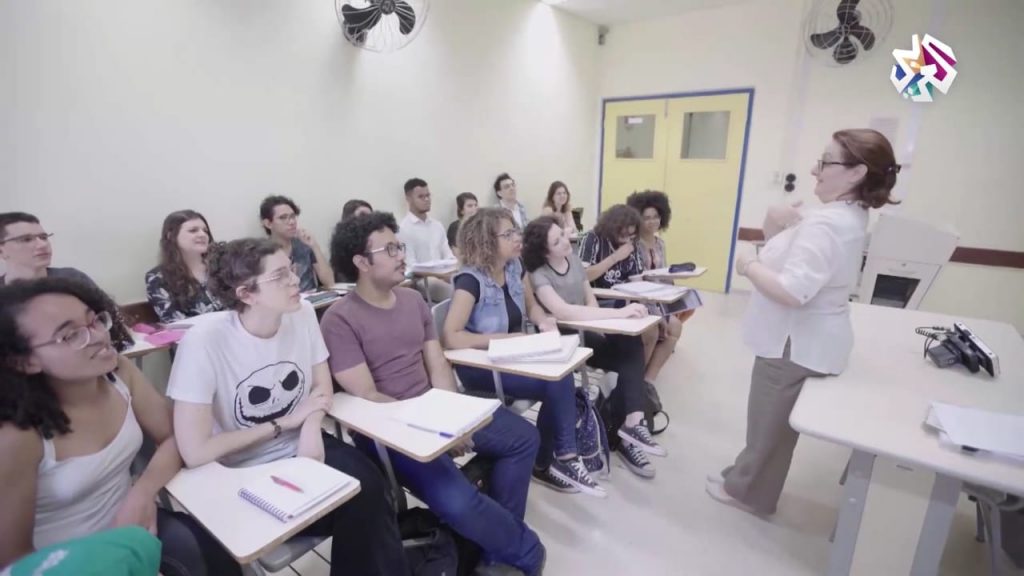São Paulo – The teaching of Arabic in Brazil and the evolution of this field of knowledge until this day are now documented in film. Abdurrahman Abu Hasna’s “Dâd in São Paulo,” featuring professors and students from the University of São Paulo (USP), premiered late last May.
‘Dâd’ is one of the letters of the Arabic language. “It doesn’t exist in any other language, so it’s a special feature of Arabic,” explains the Palestinian filmmaker, who moved to Brazil a year and a half ago and decided to recount how the presence of Arab immigrants led to the language being taught at one of the leading universities in the country.
The whole film is spoken in Arabic. It premiered on May 28 in the London-based Arabic TV channel AlAraby TV, which funded the production. This is Abu Hasna’s first documentary film. “Upon arriving in Brazil, I was aware of the historical ties between the Arabs and this wonderful country, because I had read lots of diaspora literature by the great Arab poets who lived in the Americas. Much of the poetry they wrote is arguably among the most important poetry produced in Arabic literature.”.

The holder of a degree in Filmmaking from the Tehran Art University, Abu Hasna has made short films including “A wave stole my hand” (Beirut, 2018). In Brazil, he set out to portray the country’s reality and its cultural connection to the Arab world. “During a visit to the University of São Paulo, I learned that there was a course in Arabic. That had a big impact on me, and it made me feel very optimistic. I discovered a great connection between myself, as an Arab and an Arabic speaker, and Brazil and its people,” he said.
While seeing Brazilian students learning Arabic was the beginning, the real turning point came when he found out about professor Safa Jubran, then the head of the USP Department of Oriental Languages. “I heard that they’d call her the ‘Dâd’ Lady.” That’s when she became the main character and the driving force behind the film. “It’s notable that she speaks Arabic fluently, in a tone that is familiar to me,” said Abu Hasna.
Jubran’s life is a one-of-a-kind story about the teaching of Arabic in São Paulo. She has been working to spread Arabi culture and the language and literature ever since she graduated from USP. The film shows her at home and at work. Jubran said being featured was an interesting experience of “a faithful account of the normal, regular life of a professor and her life story.”

Abu Hasna decided that the story of Jubran, which straddles Arab and Brazilian culture, would be the essence of the film. Arabic students at USP were also interviewed. “These lovers of Arabic and literature, who were in the cutting edge when it came to championing Arab culture and Arabic language, were coleads in this film,” the director said.
Filming took 10 days and editing took 40. “It was a beautiful experience in which the spirit of adventure was prevalent, especially since I didn’t speak Portuguese fluently. However, having a good team made the work much easier,” said Hasna regarding his work with AH Produções e Traduções. “The adventure of making this film was a novel experience, dealing with a new country that is vast and deep, and full of stories that we weren’t aware of. It has also allowed us to find out about other aspects of Arab immigration to Brazil,” he said.
Thanks to being shown on TV and publicized on social media, the production got viewed by Arabic speakers all over the world, rather than just in Arab countries. “I got happy messages fro all over the world. People were surprised, because they weren’t aware of our work and our achievements, and now it’s all documented,” said professor Jubran. “Apart from focusing on the Arabic course, past and present, the film also approached Arab immigration to Brazil to provide some context.”
“The importance of this production is in showing what this group of university professors are doing in terms of teaching, education, research and training of researchers, without any help from Arab governments or institutions, as is the case with other courses. And still these professors and their students are able to create and spread quality knowledge which the Arab world should know about,” said Jubran, adding that the course is waiting for initiatives in Arab countries that will enable Arab culture and language to be disseminated in an even more efficient way.
You can watch the documentary in Arabic below. Subtitles in Brazilian Portuguese will be available soon.
Translated by Gabriel Pomerancblum




